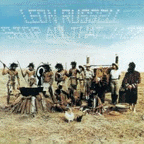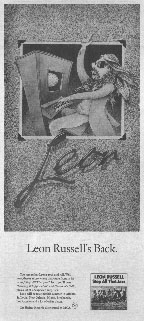![]()
  |

Stop All That Jazz
Leon Russell
Shelter SR-2108
Released: May 1974
Chart Peak: #34
Weeks Charted: 16
 Those who visit the Leon Russell empire at Disney, Oklahoma, and do not succumb to Russell's dark magnetism come away muttering about mind games and mass manipulation and even "rock evangelism." Rita Coolidge, I know, was glad to pull herself away from the Russell influence. I have seen rock audiences who could not resist his control begin behaving just the way I have seen audiences react to another Oklahoma performer, Oral Roberts. Both Roberts and Russell offer a form of salvation and, importantly, both men appear to have been tamed by success, which led in both cases to a quest for respectability. That quest, in turn, has drastically altered both men's work: Roberts becomes a southwestern Billy Graham and Russell becomes musically schizoid.
Those who visit the Leon Russell empire at Disney, Oklahoma, and do not succumb to Russell's dark magnetism come away muttering about mind games and mass manipulation and even "rock evangelism." Rita Coolidge, I know, was glad to pull herself away from the Russell influence. I have seen rock audiences who could not resist his control begin behaving just the way I have seen audiences react to another Oklahoma performer, Oral Roberts. Both Roberts and Russell offer a form of salvation and, importantly, both men appear to have been tamed by success, which led in both cases to a quest for respectability. That quest, in turn, has drastically altered both men's work: Roberts becomes a southwestern Billy Graham and Russell becomes musically schizoid.
Russell seldom alludes to his evangelical side, but drops a few lines in his adaptation of "If I Were a Carpenter" on this album:
- I get so mean sometimes
- When the spirit's on me
- Think I'll think I'm Jesus
- Out buildin' crosses
- When the spirit's on me
 Click image for larger view. |
The last time he granted a lengthy interview, Russell mentioned that he enjoyed making people wonder about him, speculate and ponder his actions and motives, and his career suggests that he works overtime at inspiring that wonder. It's difficult to imagine, in an industry often predicated on aberrations, a stranger musical history: Okie greaser makes good by being odd. Along the way, he has remained an enigma, masking himself first as a pompadoured sessionman, then as the mysterious Master of Time and Space, and lately as C&W songster Hank Wilson.
When he was working sessions in Los Angeles and arranging songs for the Ronettes and the Crystals and writing hit for Gary Lewis and the Playboys, no one would have predicted that this surly guitarist and pianist would one day parlay a secondhand knowledge of gospel music, a firsthand experience of hit-making, and a cosmic aura into a brilliant -- for a time -- rock career. Even the Asylum Choir gave no hint of a budding superstar, perhaps because it is not in Russell's nature to be just a collaborator.
Once he emerged from seclusion in his Skyhill Road studio in Los Angeles with a firm purpose in his mind, however, Russell's rise to prominence was hypersonic. He seemed to be everywhere. His excellent sessionwork on the first Delaney and Bonnie album was a modest beginning, leading to sessions with Joe Cocker and, ultimately, with Eric Clapton and the Stones. He was just weird enough, talented enough and pushy enough to accomplish what he wanted. With disarming ease, he transformed Mad Dogs and Englishmen into a showcase and giant stepping stone for Leon Russell. Still, he remained a mystery, a nonplus in a top hat and Holy Trinity shirt. Later, he would achieve longtime ambitions by producing Bob Dylan ("Watching the River Flow"/"When I Paint My Masterpiece") and by filming a documentary of himself.
When Russell was still a solid rocker, his music revealed nothing, except that he found it as easy to write a particular brand of flamboyant gospel-based rock for himself as it was to write hits for Gary Lewis. His albums, up through Carney, were deftly original, satisfying works, and his tendency for musical satire (a satire in itself) was evident and very effective in ballads and rockers from "My Cricket" to "Roller Derby."
It's easy now to tell that his introduction of the unexpected element has all along been the key to his success, lyrically, musically and personally. It's also easy -- and painful -- to understand that his notion of the unexpected is no longer effective, especially now that popular music is the proving ground for every imaginable experiment.
Stop All That Jazz -- the title is a parody that doesn't work -- is an awkward pastiche of substanceless songs and attempts at jazz that just fall flat. In an interview, Russell once said of Dylan that he "was making musical constructions that were far beneath his actual awareness, just so they could be assimilated by a lot of people." If that is not what Russell himself is attempting here, then his is a sad, sad failure of an album, a schizophrenic display. His attempts at brassy jazz -- especially "Mona Lisa Please" -- are such direct copies of Ray Charles that I know he's been memorizing Charles's Genius Plus Soul Equals Jazz.
Excesses here pile up on one another like derailed train cars: "The Ballad of Hollis Brown" is an embarrassing Isaac Hayes emulation that must burn Dylan's ears; "Spanish Harlem" is cocktail reggae; "If I Were a Carpenter" is so bad that I hope it's a parody, although I fear it's not; Mose Allison's "Smashed" is delivered as froth; "Streaker's Ball" is nonsense. The only bright spots are "Leaving Whipporwhill" (which, unhappily, borrows its structure "Roller Derby") and isolated moments of other songs.
Even when Russell is bad, there's still enough going on occasionally that it's not a disaster. This aimless noodling, however, is not what you expect form an acknowledged major rock artist. His jazz is even less convincing than his C&W, and half-a-dozen close listenings to Stop All That Jazz produce a mental numbness that convinces me, at least, that Russell shouldn't be taken seriously again until he puts honest effort into a release. It's been almost two years since Carney, since the last time Russell had something original to say, and it increasingly appears that he's simply throwing anything he can find into the gap and hoping that the gullible public will pay inflated prices for a deflated product.
- Chet Flippo, Rolling Stone, 8/1/74.
Bonus Reviews!
No doubt it's my lack of Christian charity, but I get the feeling that Leon Russell spends his days off practicing his accent. After a little while it gets annoying to hear him pronounce "well" like "way-all." As with the Five Satins' weeping at rock-and-roll revival concerts, I begin to think it's part of the act.
Quibble, quibble. Russell flirts with jazz this time, but never quite commits himself, in "Smashed," "Mona Lisa Please," "Stop All That Jazz," and "Spanish Harlem." The last is the most successful. It is done as an instrumental, with soft, tight horns stating the melody and Russell taking a piano solo that is somewhere between Ahmad Jamal and Roger Williams. "Smashed" was written by jazz balladeer Mose Allison and is the best tune in the album. The other two are Russell pastiches of jazz and his smeary approach to rock.
His own material here is facile and kind of halfhearted. The two worst essays are his rewriting of "If I Were a Carpenter," which makes the tune dumber than it already is, and "The Ballad of Hollis Brown," one of those dreary Dylan "folk" ballads from the halcyon mid-Sixties when the much admired Master Zimmerman was supposed to be "The Conscience of Us All."
Russell has certainly turned in better and more cohesive performances. At his best he can be very exciting. At his worst, he falls back on steamy theatrics (including his accent) and trusts for the rest to his notoriety. None of it works here. He can do better, and he should.
- Joel Vance, Stereo Review, 10/74.
Russell floats in and out of our consciousness, and whenever he returns it's always interesting to see what he's going to try next. This album is a combination of original Russell tunes and interpretations of classics so well known to us all that we've forgotten them completely.
Take the opener, "If I Were A Carpenter." Who would think of trying to do anything fresh or interesting with "If I Were A Carpenter"? Leave it to Leon to find an arrangement no one has ever tried before. I'm not saying it's very good, it's just very different. What is gone from the song is the poignancy, which was one of the most important qualities it had. Leon should remember that funkiness is not the answer to all the world's problems.
One of the more unusual tracks on the LP is Russell's instrumental version of "Spanish Harlem." There is a lovely jazz feel which works beautifully. Another good track is Mose Allison's classic "Smashed." Sounding more like Mose than Leon, or maybe Georgie Fame in disguise, Leon takes us through the paces of some of the best swing-style jazz I've heard in a long time. There's some highly proficient horn work by Ronnie Wilson, Tommy Lokey and Chris Clayton.
"Leaving Whippoorwill," a Leon Russell original, is closer to what we've always come to expect from the man. There's some strong piano work, coupled with some funky drum and guitar work, and some especially fine dobro playing by Don Preston.
My favorite track on the album is Leon's own "Streaker's Ball." Sounding more like Ray Davies than anyone else, Russell plays some great honky-tonk piano on this one. It feels very old, and it's a great shock to see that he wrote the song himself.
I'm not quite sure if jazz/rock is the answer to all our problems, or if this particular direction is the new one. But the album is a pleasant change.
- Janis Schacht, Circus, 9/74.
Stop all this crap. For anyone who's counting, this makes three strikes since Carney. Ego rock at the zenith of it's nadir. *
- Ed Naha, Circus, 9/74.
Leon is back with what is basically his first new LP in two years, following a live set and a country album under the name of Hank Wilson, and for the most part, it's the same Leon Russell that has made him such a monumental star over the past five years. Taking a Tim Hardin or a Bob Dylan cut and rearranging it to his personal style or handling some of the fine originals he has put together for the set, Russell's distinctive voice and piano remain the highlight of the album. An instrumental adds some more depth to the set. All in all, this is a very fine return for one of the few true superstars in American pop music, and one that should prove another monumental seller for him. Best cuts: "If I Were a Carpenter," "Streaker's Ball," "Working Girl," "The Ballad of Hollis Brown."
- Billboard, 1974.
The bad jokes start with the cover, which depicts Leon in a cannibal stewpot, the joke being that since he's not even tasty any more why would they bother? (Oo-ee). Leon's version of "If I Were a Carpenter" has a part about rock stars and groupies that is even dumber than the original. (Stop, my sides are splitting.) And the title is a sly reference to the horn riffs which are the only music on this record I ever want to hear again. (Stop anyway.) D+
- Robert Christgau, Christgau's Record Guide, 1981.
![]() Reader's Comments
Reader's Comments
No comments so far, be the first to comment.